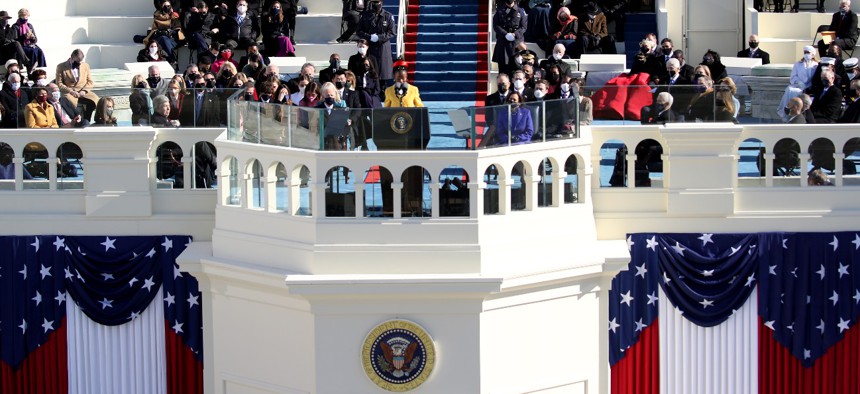
Legislation is aimed at avoiding the problems of the Trump-Biden transition. Rob Carr/Getty Images
Lawmakers Take Another Step Toward Avoiding the Chaos of the Last Presidential Transition
A bill would require transition resources to go to both sides if there is a time period when the election results are in doubt.
Lawmakers are now one step closer to enacting reforms aimed at making presidential transitions smoother following the chaotic changeover from Trump to Biden, but there are still hurdles to overcome.
Reps. Josh Gottheimer, D-N.J., co-chair of the House Problem Solvers Caucus, and Fred Upton, R-Mich., vice chair of the caucus and one of the 10 House Republicans who voted to impeach President Trump following the Jan. 6, 2021 attack on the U.S. Capitol, unveiled a House companion version to the Electoral Count Reform and Presidential Transition Improvement Act. The Senate version was introduced by a bipartisan group in July.
“With this bipartisan, bicameral legislation, both sides of the aisle are coming together to protect our great democracy, preserve the integrity of our elections, and prevent any attempts to undermine them,” said Gottheimer, in a press release. “Our nation’s future depends on it and the time to act is now.”
The Biden-Trump presidential transition was unprecedented for reasons beyond the COVID-19 pandemic, particularly relating to the General Services Administration's delay in ascertaining the results of the election in the face of legal challenges by Trump’s team, based on false claims. The slow ascertainment meant the federal government was delayed in making transition resources and funding available to the Biden team. Then, as members of Congress were taking up the certification of the election on Jan. 6. 2021, with then-Vice President Mike Pence presiding, a mob attacked the U.S. Capitol. Trump, who had continued to push for the results of the election to be overturned, was later impeached––for the second time––by the House for inciting an insurrection, then acquitted by the Senate.
The new bill would allow for more than one presidential candidate to receive transition resources if there is a time period when the result of the election is “reasonably in doubt.” It then says what the General Services Administration administrator should consider to decide the certainty of the election: whether or not legal challenges that could change the result are resolved; states’ certification of their election results; and “the totality of the circumstances.”
A candidate will be the only candidate eligible to receive transition resources when they receive the majority of pledged election votes and there aren’t any other legal or administrative actions pending, they receive the majority of the electoral votes at the electors meeting in December after the election, or they are formally elected during the joint congressional meeting on January 6.
There would also be new reporting requirements.
If neither candidate has conceded, then the GSA administrator has to report on the federal resources given to both candidates; provide Congress with weekly updates on the transition; and issue a written public opinion on the legal basis and reasons for a single candidate being ascertained the winner of the election.
When then-GSA Administrator Emily Murphy ascertained Biden as the winner in 2020, more than two weeks after all major news outlets declared him the president-elect, she described the challenges she faced while under enormous pressure. She also suggested Congress make reforms to the process.
The other component of the bill would reform the 1887 Electoral Count Act following the evidence brought forth by the House committee investigating the Capitol attack, impeachment trial and news reporting that has shown the lengths Trump and his officials went to disrupt the certification process by members of Congress.
Gottheimer and Upton’s “leadership helps build momentum to pass these significant and much-needed reforms,” said Sen. Susan Collins, R-Maine, and Joe Manchin, D-W.Va., who were among the lead sponsors of the Senate bill. “We will continue to work with our colleagues to increase bipartisan, bicameral support for this legislation.”
It is unclear if the House will take up this bill in the remaining weeks it has in session before the midterm elections (during which Democrats are expected to lose the House) as it also faces a Sept. 30 government funding deadline. According to NBC News, members of the House Jan. 6 committee Reps. Liz Cheney, R-Wyo., and Zoe Lofgren, D-Calif., chair of the House Administration Committee, are expected to release a competing bill that is broader.
“There’s an urgency to act” on the Electoral Count Reform and Presidential Transition Improvement Act, as well as the Enhanced Election Security and Protection Act, because “Democrats—and some Republicans—worry that a possible GOP-controlled House, wary of triggering former President Donald Trump’s ire, would ignore the issue next year,” NBC also reported. “But in the Senate, the growing expectation is that a vote will be punted into the lame duck session between the Nov. 8 midterm election and when the new Congress is seated on Jan. 3.”
Reasons for delay, as outlined in the report, include Congress is working to prevent a government shutdown and Sen. Amy Klobuchar, D-Minn., chair of the Senate Rules Committee, indicated at a hearing recently that she wants to make changes to the electoral count and transition bill, “which are still being negotiated.”







